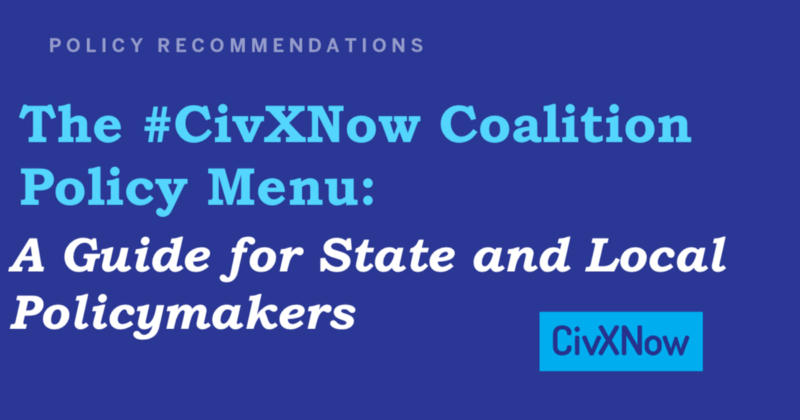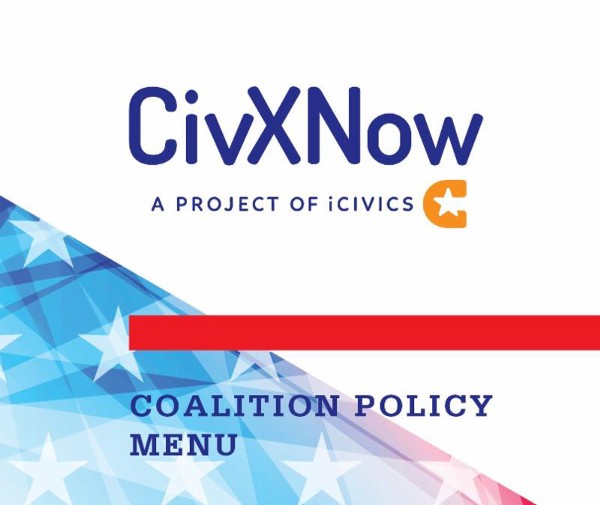
As the nation increasingly turns to education as a means to address the state of civic affairs, just how education may have an impact remains one of the most persistent questions. In an effort to provide a well-founded response, members of the CivxNow Policy Taskforce have been hard at work over a number of months to develop a menu of research-validated policy recommendations. The CivxNow Policy Menu is designed to offer options for state and district policymakers to take well-informed action to strengthen and improve civic learning for all K-12 students. This month, CivxNow is proud to release the results.
The document stems from a rigorous review. Coalition partners have offered invaluable feedback. Outside counsel on the Policy Menu has included policymaker organizations, as well as civic engagement and civil rights groups. In addition, a number of current and former officeholders offered their suggestions as well. On March 14th, CivxNow hosted a Coalition-wide webinar to solicit feedback on the Policy Menu from all Coalition members.

The Policy Menu, accompanying one-pager, and CivxNow webpage of resources are designed as tools for state-level civic learning advocates to answer the oft-asked question from policymakers, “I agree we have to do something to improve civics, but what should we do?” It addresses all the key aspects of education policy as they relate to civic learning, including standards, assessments, course & time requirements, teacher preparation/professional development, equity, youth voice, and other critical areas of effective civic learning.
The policy recommendations are:
- State Learning Standards: As states undertake periodic revision of their standards for learning in the social studies, they should build on the ‘College, Career and Civic (C3) Life Framework for Social Studies State Standards,’ developed by a consortium of 20 states. Drawing on the concepts in the Framework, states should work to make their standards, fewer, clearer and more rigorous, emphasizing the role of the citizen in our constitutional republic and offer opportunities for students to learn to make informed civic decisions.
- Assessment and Accountability: States should ensure that assessments include end-of-course objective assessments as well as performance-based assessments or other alternative assessments. States should ensure the testing instruments (objective and alternative) offer a comprehensive measure of civic learning and will permit the reporting of results disaggregated by subgroup. States should include appropriate assessment in civics in their accountability systems.
- Course and Time Requirements: States should work to strengthen their course requirements in civic education. Based on existing research and recognized best practices, strengthened course requirements should include:
- More time devoted to civic learning in the elementary grades with a common upper elementary assessment to ensure that students acquire foundational knowledge and concepts;
- A full semester civics course in middle school, that utilizes the Proven Practices of the ‘Civic Mission of Schools’ reports, with an opportunity for students to learn through a real-world civic policy project and common end of course assessment;
- A full-year high school civics course, utilizing the Proven Practices of the ‘Civic Mission of Schools’ reports, with an opportunity for students to learn through a real-world civic policy project and common end of course assessment using a traditional objective paper/pencil or online test as well as an alternative form of assessment (portfolio, classroom-based) with passage linked to high school graduation.
- Pre-Service Requirements: States should strengthen pre-service requirements for civics teachers by requiring undergraduate courses in US Government and American History as well as undergraduate course work in the unique pedagogy of civics, including use of experiential learning, use of simulations, guided classroom discussion of controversial issues, service learning linked to classroom learning, student projects, and differentiated instruction. Certification tests should be adapted to assess pre-service teacher achievement in these areas.
- Professional Development: States should provide adequate resources for ongoing civics teacher professional development, on par with the professional development provided to math, literacy, and science teachers.
- Equity: States, districts, and schools should work together to develop strategies and devote resources that will reduce racial and economic disparities in civic learning opportunities and achievement.
- Implementation: Policies do not implement themselves. States should establish or empower an in-state entity to help schools and districts implement new policies.
- Youth Voice: Each state should ensure youth voice and participation is included in education and community decision making by including meaningful student representation on local boards, commissions, and other governmental bodies. Student representatives should be accountable to their peers.
- School Climate, Culture, and Leadership: School climate matters. Schools and districts should take the necessary actions to ensure that policies and practices related to school discipline, school safety, and culture reflect democratic ideals and that students experience democratic practices throughout the school day.
- Democracy Schools: States should establish a recognition program to encourage educational excellence, continuous improvement, and replication of effective programs.
CivxNow remains committed to ensuring that the Policy Menu serves as a useful guide for policymakers in all states as they craft new policies and support practices to ensure effective and equitable civic learning is the reality for all students in the nation.


 See All
See All